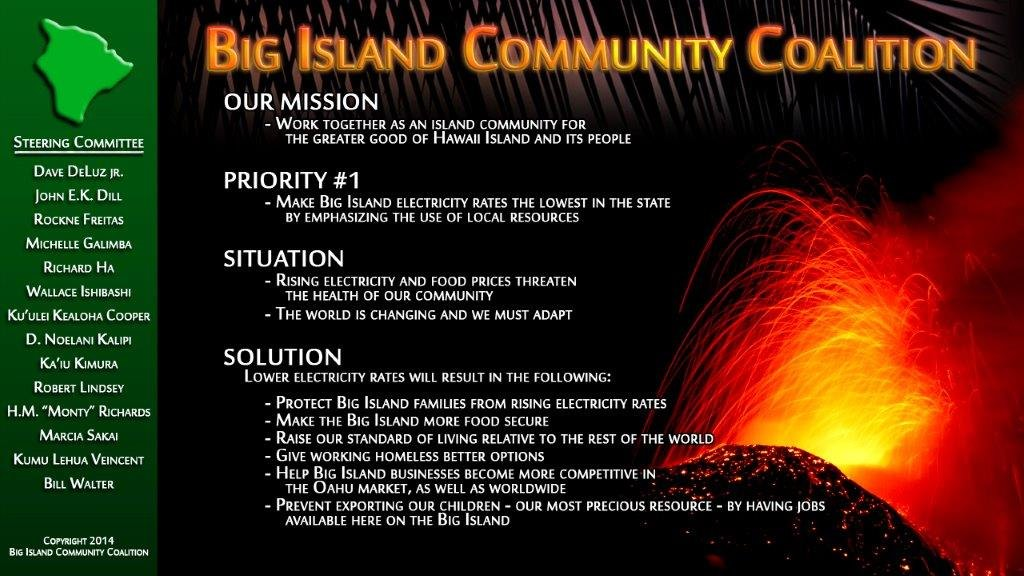Did you see the op-ed in yesterday’s Honolulu Star-Advertiser? In case you didn’t, this is what I submitted to them:
***
We Need Cheaper Electricity
By Richard Ha
Here is the single most important need facing Hawai‘i today. Everything else radiates from it:
We need cheaper electricity.
It can be done. Recently the Big Island Community Coalition, along with others, helped stop some fairly significant electricity rate hikes from showing up on everybody’s HELCO bills.
And we are very lucky to have resources here, such as geothermal energy, that we can use to generate much cheaper electricity.
Here’s why this is so important:
• We need enough food to eat, and we need to grow it here, instead of relying on it coming to us from somewhere else.
Food security – having enough food to eat, right here where we live – is truly the bottom line. We live in the middle of an ocean, we import more than 80 percent of what we eat, and sometimes there are natural or other disasters and shipping disruptions. This makes a lot of us a little nervous.
• To grow our food here, we need for our farmers to make a decent living: “If the farmers make money, the farmers will farm.”
The price of oil, and of petroleum byproducts like fertilizers and many other farming products, keeps going up, which raises farmers’ costs. They cannot pass on all these higher costs, and they lose money.
We use oil for 70 percent of our electricity here in Hawai‘i, whereas on the mainland they use oil for only 2 percent of theirs—so when the cost of oil increases, anything here that requires electricity to produce is less competitive. And farmers in Hawai‘i also pay four times as much for electricity as do their mainland competition, which puts them at an even bigger competitive disadvantage. Fewer young people are going into farming and this will impact our food security even further.
HELCO needs to be a major driver in reducing the cost of electricity. We believe that HELCO is fully capable of providing us with reliable and less costly electrical power, and ask that the PUC reviews its directives to and agreements with HELCO. Its directives should now be that HELCO’s primary objective should be making significant reductions in the real cost of reliable electric power to Hawai‘i Island residents.
At the same time, we ask that HELCO be given the power to break out of its current planning mode in order to find the most practicable means of achieving this end. We will support a long-range plan that realistically drives down our prices to ensure the viability of our local businesses and the survivability of our families. All considerations should be on the table, including power sources (i.e., oil, natural gas, geothermal, solar, biomass, etc.), changes in transmission policy including standby charges, and retaining currently operating power plants.
This is not “us” vs. “them.” We are all responsible for creating the political will to get it done.
Rising electricity costs act like a giant regressive tax: the people on the lowest rungs of the economic ladder get hurt first, and hardest. If our energy costs are lower – and we can absolutely make that happen – our farmers can keep their prices down, food will be cheaper, and consumers will have more money left over at the end of the month. This is good for our people, and for our economy.
We have good resources here and we need to maximize them. Geothermal and other options for cheaper for energy. We also have the University of Hawai‘i, the College of Tropical Agriculture and Human Resources, the Pacific Basin Agricultural Research Center and others that help our farmers.
To learn more about achieving cheaper electricity rates, consider joining the Big Island Community Coalition (bigislandcommunitycoalition.com; there’s no cost). We send out an occasional email with information on what we’re doing to get electricity costs down, and how people can help.
Remember the bottom line: every one of us needs to call for cheaper electricity, and this will directly and positively impact our food security.
Richard Ha is a farmer on the Big Island’s Hamakua coast, a member of the state’s Board of Agriculture, and chairman of the Big Island Community Coalition.
***

